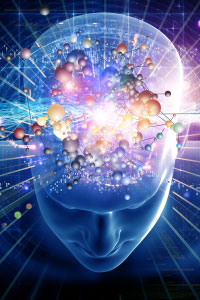How Substance Abuse Changes the Brain’s Basic Thought Processes
Alcohol and all commonly abused drugs alter your experience of reality by altering the levels of chemicals in your brain known as neurotransmitters. Generally speaking, problems with alcoholism and drug addiction begin when your brain gradually adapts to the long-term changes in neurotransmitter levels. In the scientific community, much of the focus on abuse- and addiction-related brain changes has centered on dopamine, a neurotransmitter that plays a key role in the normal function of the brain’s pleasure centers. However, altered levels of another neurotransmitter, called glutamate, also contribute to the onset of addiction by changing the ways in which you learn, make decisions and engage in other basic thought processes.
Neurotransmitter Basics
 Neurotransmitters get their name because they give cells in the nervous system, called neurons, a way to transmit chemical messages to each other. Their actions are necessary because neurons don’t make direct physical contact with each other; instead these cells are separated by tiny gaps called synapses. To communicate with its closest neighbor-and to trigger the larger waves of communication that coordinate brain activity-a neuron will release a neurotransmitter into the synapse that sits between it and that neighbor. The neurotransmitting chemical will then cross the synapse and attach itself to a site on the neighboring neuron called a receptor; in turn, contact with this receptor will create specific changes inside the neuron that alter the neuron’s current level of activity. Basic brain communication results from chain reactions of these neurotransmitter-driven neuron changes.
Neurotransmitters get their name because they give cells in the nervous system, called neurons, a way to transmit chemical messages to each other. Their actions are necessary because neurons don’t make direct physical contact with each other; instead these cells are separated by tiny gaps called synapses. To communicate with its closest neighbor-and to trigger the larger waves of communication that coordinate brain activity-a neuron will release a neurotransmitter into the synapse that sits between it and that neighbor. The neurotransmitting chemical will then cross the synapse and attach itself to a site on the neighboring neuron called a receptor; in turn, contact with this receptor will create specific changes inside the neuron that alter the neuron’s current level of activity. Basic brain communication results from chain reactions of these neurotransmitter-driven neuron changes.
There are dozens of neurotransmitters in your body, and each one of them sends a specific chemical message between neurons. At one time, scientists thought that all neurons could only release one type of neurotransmitter. However, they now know that some neurons can release different chemicals in different circumstances. In addition, some neurotransmitters are more common than others and get released by more neurons inside the brain.
Glutamate Basics
Glutamate comes from glutamic acid, a protein building block (amino acid) found inside your body. It is the brain’s most common neurotransmitter, and roughly 80 to 90 percent of all neurons in the brain release this chemical. Glutamate’s basic function is excitation or stimulation; under its influence, previously unstimulated neurons go into a kind of “alert” mode, and previously stimulated neurons maintain their current alert status. By making these changes, glutamate contributes to a vitally important brain ability called synaptic plasticity, which essentially lets the brain adapt to changes in the information coming in from the outside world. You rely on this basic brain adaptability for such basic functions as your ability to learn, create and retain memories, control your behavior, and make judgments and decisions based on your previous life experiences.
Consequences of Altered Glutamate Levels
Drugs and alcohol have varying effects on the brain’s glutamate levels, the University of Utah’s Genetic Science Learning Center explains. For instance, alcohol decreases glutamate levels and therefore decreases neuron excitation; on the other hand, many drugs increase glutamate levels and therefore increase neuron excitation. If you habitually use any substance that significantly alters your glutamate levels, glutamate-releasing neurons in your brain will try to alter their natural production of the neurotransmitter in order to compensate. In cases where a substance increases glutamate levels, neuron compensation will result in a reduction in normal output of the chemical; in cases where a substance reduces glutamate levels, neuron compensation will result in an increase in normal output.
Over time, these compensating activities corrupt the brain’s ability to maintain its normal degree of adaptability or plasticity. In turn, changes in brain plasticity lead to alterations in learning, memory, decision-making and judgment. These alterations lay the groundwork for alcoholism and drug addiction by creating mental environments that support persistent alcohol or drug cravings and compulsive alcohol- or drug-seeking behavior. The presence of these mental environments is the hallmark of a substance addiction.
Considerations
Another neurotransmitter, called gamma aminobutyric acid (GABA), acts as the counterpart to glutamate by decreasing or inhibiting normal neuron excitation. In addition to altering glutamate levels, alcohol and certain drugs of abuse alter GABA levels; in turn, these GABA alterations play a significant secondary role in determining how substance abuse affects learning and other conscious thought processes. Apart from its role in these processes, glutamate also plays a supporting role to dopamine in the normal function of your brain’s pleasure centers. While dopamine alterations largely account for the ways in which substance abuse affects these centers, glutamate alterations are a reinforcing factor. Other neurotransmitters involved in the process of addiction include norepinephrine, serotonin and acetylcholine.



